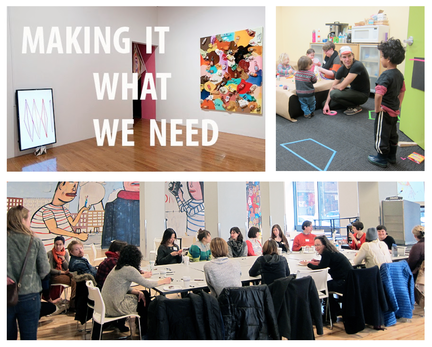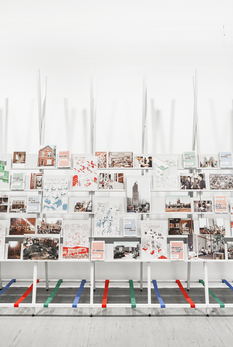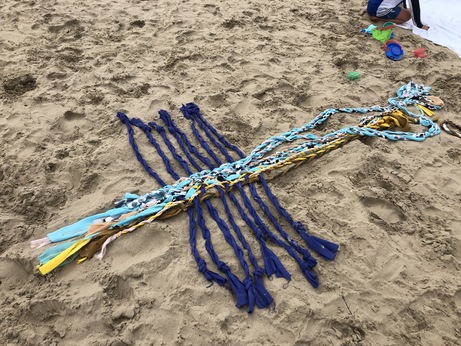Wool Work
Emily Winter
Dec 05, 2019
(6pm)
Talk
Please RSVP
Emily Winter from The Weaving Mill discusses her recent research into domestic wool supply chains, following Navajo-raised wool in its transformation from raw material to the stuff of craft. Starting with its entry to the supply chain at the annual Navajo Nation Wool Buy, through grading, scouring, spinning, and weaving, this project opens up the typically-opaque steps of the supply chain through site visits and interviews. This fieldwork is part of the larger project and ethos of The Weaving Mill, in which consideration of the material, social, and historical contexts that shape the work and operations of the studio is a fundamental piece of the practice itself.
Emily Winter is a weaver based in Chicago. She is co-founder of The Weaving Mill, an experimental weaving studio in Humboldt Park that blends design, fine art, textile education, and research-based practice in the context of a repurposed textile manufacturing facility housed in a day program for adults with developmental disabilities. She has a master’s in textiles from the Rhode Island School of Design and a bachelor’s in history from the University of Chicago.
The Weaving Mill is an experimental weaving studio in Chicago’s Humboldt Park that blends design, fine art, textile education, and research-based practice.
Image: Waiting in line at the Wool Buy, Tuba City AZ, June 2019
For more information on the exhibition, Tatiana Bilbao Estudio: Unraveling Modern Living, click here.

Making It What We Need
Cultural ReProducers with Christa Donner
Nov 23, 2019
(10am)
Workshop
Space is limited, please complete this form to express interest in participating:
Help create the creative community you'd like to be a part of—in conversation with curators, artists, arts administrators, and others. Making it What We Need is a generative workshop considering alternative models for living, making, and making a living as artists, led by Cultural ReProducers organizer Christa Donner. Non-parents are welcome to join the conversation, which will be relevant to anyone working toward a sustainable life in the arts. Free, on-site childcare will be available through pre-registration.
Christa Donner is an artist, curator, and mother and founder of Cultural ReProducers, who incorporates drawing, participatory performance, and small-press publications to create multi-layered projects that are both intimate and community-centered. Donner’s work is exhibited widely internationally and throughout the United States.
Cultural ReProducers is an evolving group of active cultural workers—artists, designers, curators, musicians, performers, writers, etc.—who are also parents. Founded in 2012 by artist Christa Donner, the group is a creative platform, web resource, and community-based initiative that is for anyone interested in making the art world a more inclusive and interesting place by supporting arts professionals raising kids.
For more information on the exhibition, Tatiana Bilbao Estudio: Unraveling Modern Living, click here.

Commoning the City—Notes from assembling an Atlas
Stefan Gruber
Nov 21, 2019
(6pm)
Talk
Please RSVP
Against the backdrop of the escalating climate crisis, social inequity, and political polarization, the failures of governments or markets to provide even access to resources and opportunities is leading citizens worldwide to take matters into their own hands—self-organizing by pooling resources and claiming their collective right to the city. The creative insights emerging from these practices of commoning offer an entry point for refuting the neoliberal mantra “there is no alternative,” and spurrs the imagination of another possible world. This talk asks many questions, including: What impact can commoning have on the bottom-up transformation of cities? And what agency do designers have in contributing to such commons transition?
Stefan Gruber is an associate professor in architecture and urbanism at Carnegie Mellon University, where he directs the master of urban design program. His work spans design-built projects, and interventions in public space, urban design, and research with a particular focus on spatial practices and the political as articulated through the negotiation of top-down planning and bottom-up transformations of cities. Most recently, Gruber guest-edited ARCH+ magazine 232: An Atlas of Commoning and cocurated the eponymous travelling exhibition. Previous books include Spaces of Commoning (Sternberg, 2016), Big! Bad? Modern (Park Books, 2015) and Vienna: Slow Capital (Academy of Fine Arts Vienna, 2011). Gruber founded STUDIOGRUBER in 2006 after working with Diller, Scofidio + Renfro. His research and design work has been published and exhibited internationally and supported by the Graham Foundation, and fellowships from Margarete Schütte-Lihotzky and Akademie Schloss Solitude, among others.
Image: The travelling ifa-exhibition An Atlas of Commoning on display at the Kunstraum Kreuzberg/Bethaninen in Berlin. Photo: © Sebastian Schels
For more information on the exhibition, Tatiana Bilbao Estudio: Unraveling Modern Living, click here.

Macro Weaving Workshop
The Weaving Mill
Nov 16, 2019
(10am)
Family Program
Space is limited, please complete this form to express interest in participating:
Twisting recycled fabrics into giant yarns, we will create a macro-weaving, using our bodies to create a multi-person-human-loom, transforming weaving into a participatory game that zooms in on the over-under of woven cloth. This workshop is recommended for children 5 and older.
The Weaving Mill is an experimental weaving studio in Chicago’s Humboldt Park that blends design, fine art, textile education, and research-based practice.
For more information on the exhibition, Tatiana Bilbao Estudio: Unraveling Modern Living, click here.

Connecting People to the Prairie
Midewin National Tallgrass Prairie
Nov 16, 2019
(2pm)
Talk
Please RSVP
Author and Midewin volunteer Arthur Pearson and Midewin Archaeologist, Tribal Liaison and Heritage Program Manager Joe Wheeler will share the history of Midewin and lead a conversation about prairie connections in the built and natural environments.
United States Department of Agriculture (USDA) Forest Service International Programs & USDA Forest Service—Midewin National Tallgrass Prairie is the first of its kind in the country. Midewin represents a major effort to restore 20,000 acres of farm and industrial land to a unique American landscape and the complex ecology of the prairie. It is the largest open space in the Chicago metropolitan area and northeastern Illinois and the largest tallgrass prairie restoration effort east of the Mississippi River.
Arthur Melville Pearson is the former Director, Chicago Program for the Gaylord and Dorothy Donnelley Foundation, where he guided investments in land conservation, the arts and collections. He is the author of Force of Nature (University of Wisconsin Press, 2017) an award-winning biography of George Fell, founder of The Nature Conservancy and the Illinois Nature Preserves Commission. A long-time volunteer at Midewin, Arthur is currently writing a book-length history of Midewin, entitled, A Midewin Almanac.
Joseph Wheeler is the Prairie Archaeologist, Heritage Program Manager and Tribal Liaison at the USDA Forest Service - Midewin National Tallgrass Prairie. Before coming to Midewin in 2013 he was a field archaeologist based out of the Forest Service’s Rocky Mountain region, working throughout the West and Southwest United States. He attended graduate school in Anthropology, specializing in Archaeology, at the University of Wyoming and holds a BA from Loyola University of Chicago.
Image: Grant Creek at Midewin National Tallgrass Prairie. Photo: Bill Glass






 PREVIOUS POSTS
PREVIOUS POSTS